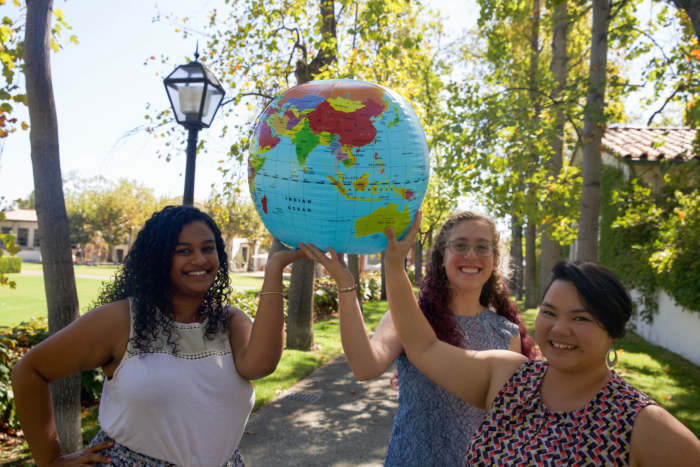
Scripps College has nominated three members of the Class of 2018—Ilana Weisberg ’18, Madeline Sy ’18, and Lina Mihret ’18—as finalists for Thomas J. Watson Fellowships. This selection puts them in the running for the prestigious grant, awarded annually to 50 students out of hundreds of graduating seniors from colleges and universities across the United States. The grant supports one year of international travel, exploration, and independent study as outlined by each student’s proposed project. Scripps’ finalists are interested in topics related to animal care culture, opera, and political violence and national identity.
“Finalists share the ‘Watson’ characteristics of having a passion they have pursued that they want to explore further,” says Associate Professor of Biology Gretchen Edwalds-Gilbert, chair of the selection committee. “We had many strong candidates, so it is a great accomplishment to be named as a finalist.”
Ilana Weisberg ’18, an organismal biology major from Sacramento, California, proposed a project driven by her fascination with the way people care for animals—and how that may differ in cultures across the globe, and in rural and urban environments.
“When I was six, one of my earliest memories is walking up to the sea otter exhibit at the Monterey Bay Aquarium with my dad and being star struck. I was enamored with the way the staff worked seamlessly with the otters and decided then and there that I wanted to dedicate my life to working with animals,” Weisberg said. Weisberg’s proposal, “Culture and Care: The Intersection of Cultural Morality and Practicality in Rural and Urban Animal Care,” would take her to Tanzania, Morocco, Vietnam, and Switzerland to compare the treatment of working animals throughout the various countries.
“Throughout this year of travel, I would hope to find constructive ways that animal care can be improved and better understood in different communities around the world. Many of my beliefs and actions reflect my Jewish upbringing, through which I was encouraged to explore the world with respect to all living creatures. These concepts sound idealistic, but they have shaped the way I interact with the living world around me.”
Madeline Sy ’18, an English major from Glendale, California, has turned her fascination with opera into an avocation as an intern for the Los Angeles Opera and is now pursuing a Watson Fellowship to broaden her understanding of the recent efforts of opera companies to make the immersive and transformative experience of live opera accessible to people with disabilities.
“My first experience with opera was listening to a cassette tape recording of the aria Un bel di from Puccini’s Madame Butterfly, and I was struck by the raw, emotional intensity that resonated with me even though I didn’t understand the lyrics being sung in Italian. My first impulse after hearing this music was to share it with my older sister and, even though she has autism and other developmental disabilities, she too was captivated by the same music,” Sy said.
Sy’s proposal, entitled “Opera and Disability” paves the way for her to learn how opera companies in Australia, Spain and South Africa are transforming the experience of live opera, from adapting the entire theater to meet the sensory needs of children with autism in Barcelona to using tactile sign language to convey the full experience of opera to people who are deaf and deaf/blind in Cape Town.
“I hope to not only learn more about the effect of disability access initiatives on the lives of people with disabilities but to also learn how changing the narrative of who can experience opera affects the way people view the purpose and function of opera and the arts in their communities.”
Lina Mihret ’18, an anthropology major who grew up in Franconia, Virginia, but was born in Addis Ababa, Ethiopia, has proposed “Enduring Grief: Narrations of Violent Losses of Home” as a way to further explore the lived experiences of those whose families and communities have experienced separatist violence in their home countries.
“The inspiration for my project came from my experiences as the daughter of Ethiopian immigrants. My household was filled with discussion about Ethiopia, its history, current events, politics, and language,” Mihret explained. “My parents very much wanted me to maintain my Ethiopian identity as a way of teaching me that I had a duty to Ethiopia even though I was raised in the United States. For my Watson year, I am interested in understanding the narratives that communities have created around the violence of the past and the ideas of nationalism that inspired it.”
Mihret said the questions she will pose include: “What do they want to have remembered and why?” “What gets left out and why?” “How do the generations that didn’t live through the violence but were raised hearing the stories of the time retell those stories?” “What is the impact of those stories in the younger generations’ ideas of identity, nation, and violence?”
In living with these communities that have experience similar to her own, Mihret said she hopes to gain a better understanding of the responsibility she has in remembering and retelling those stories that her parents shared with her about Ethiopia.

